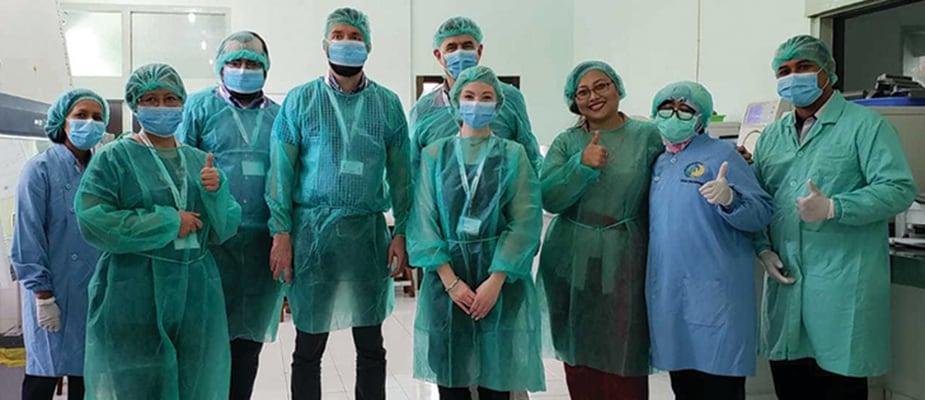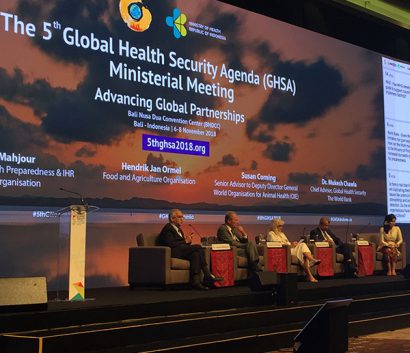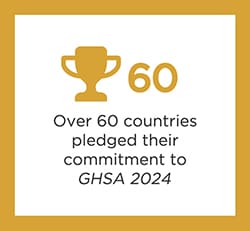International Community Renews Commitment to the Global Health Security Agenda
April 30, 2019

GHSA ministerial delegates visited Sanglah Hospital microbiology laboratory, which routinely tests for evidence of antimicrobial resistance to MRSA, MDR-TB, among other pathogens. Photo: Beth Ervin
On November 6, 2018, just one week after a deadly earthquake and tsunami struck central Indonesia, CDC’s Mitch Wolfe, Sara Clements, and Maureen Bartee traveled to Denpasar, in the southern part of Indonesia, for the 5th Global Health Security Agenda (GHSA) Ministerial Meeting.
Together with ministers of health, agriculture, and defense, as well as nongovernmental sector partners from around the world, they discussed strategies to confront the world’s vulnerability to public health emergencies and other disasters.
This Ministerial Meeting was particularly significant, as it launched the second five years of the GHSA initiative, titled GHSA 2024, which will guide national and global efforts in evaluation, planning, resource mobilization, and program implementation to build health security capacity across an interconnected global network.
WHAT IS GHSA 2024?

Representatives from WHO, OIE, FAO, and World Bank discuss global partnerships for health security, Indonesia, 2018. Photo: Maureen Bartee
GHSA 2024 builds upon the successes and lessons learned in the first phase of the GHSA, launched in 2014 by a partnership of nations, international organizations, and nongovernmental sector partners. These partners agreed to support efforts to build countries’ capacity to prevent, detect, and respond to infectious disease threats and to elevate global health security as a national and international priority.
In Indonesia, the delegates were particularly focused on advancing global partnerships. GHSA 2024 is designed to take a multi-sectoral approach to strengthening health systems, promoting international initiatives, and supporting regional efforts. The new strategy engages the broader global health security community through tangible commitments, measures progress in new and meaningful ways, and ensures accountability for reaching goals.
“Our mission is to make global health security transparent, measureable, sustainable, and proactive,” said Bartee about the updated approach. “With GHSA 2024, we’re improving health outcomes today to protect the health of tomorrow.”
IMPACTS OF CROSS-BORDER COLLABORATION

Wolfe, Bartee, Clements, and the rest of the U.S. delegation kept a packed schedule, observing progress in local clinics and laboratories in Denpasar and talking with ministerial representatives about how to better prepare for the next outbreak. From antimicrobial resistance in Senegal to community-based surveillance in Vietnam, the CDC team shared its expertise on strengthening efforts in developing countries to fight disease.
“We emphasized the importance of capacity building and private sector engagement in health security and emergency response. Governments can’t do it alone,” said Clements. By the end of the week, more than 60 countries had pledged their commitment to GHSA 2024, joining hands with international organizations, nongovernmental groups, and the private sector to envision a world safe and secure from global health threats. The momentum that started in Indonesia continues to grow as new partners join, working together to build a more protected, healthier world.
“With GHSA 2024, we’re improving health outcomes today to protect the health of tomorrow.”
– Maureen Bartee, CDC
U.S. Health and Human Services Deputy Secretary Eric Hagan, on behalf of the United States, pledged $150 million to support the goals of GHSA 2024 in high-risk countries. U.S. institutions and their GHSA partners have made significant strides in building a world more resilient to infectious disease threats.
CDC works with GHSA partners across a range of critical programs in this initiative, most notably disease surveillance, laboratory systems, workforce development, and emergency management. However, for these projects to be most successful, they must be well coordinated with those of other partners. Gatherings such as the one in Indonesia are an important way of building and maintaining the international consensus for global health security as a priority and accelerating the efforts of each partner in this important work.